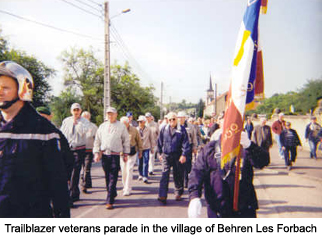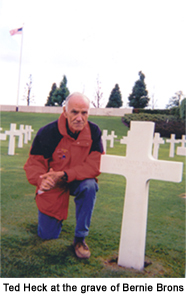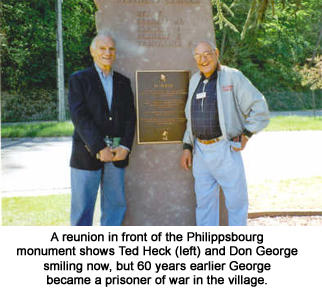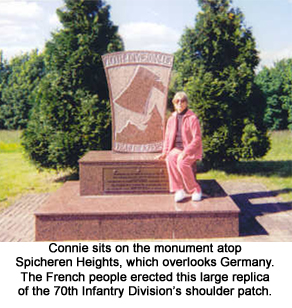French
Villages Salute Their Liberators
by
Ted Heck
We waved back as President Chirac of
France led the parade from the Arc de Triomphe down the Champs Elysees
to celebrate the 60th anniversary of Victory in Europe.
Thousands of French men and women jockeyed for position along the
temporary fences that lined both sides of the wide boulevard. Waiting
imperiously at the bottom was the statue of General de Gaulle.
Connie and I stood with other spectators
for three hours to see horse cavalry, military bands, and delegations
from other countries pay tribute to the end of World War II and to the
men and women who made victory possible.
I was in France on the first VE Day in
May, 1945, and had looked forward to being here for number 60. The
French celebrate the day every year, but this one was special. A CNN
reporter later that night said it was doubtful that many veterans of
that war would be around for the 70th anniversary. At age
83 I wince every time someone points out that we’re dying at the rate
of 1,100 a day.
 The Paris commemoration was repeated
throughout the day across France. In Reims, site of Germany’s
unconditional surrender, dignitaries had spent three days in
celebration. VE Day was the raison d’etre for the start of our
two-week journey into the past that got more personal in
Alsace-Lorraine on the German border. We connected with my “band of
brothers,” who saw combat there.
The Paris commemoration was repeated
throughout the day across France. In Reims, site of Germany’s
unconditional surrender, dignitaries had spent three days in
celebration. VE Day was the raison d’etre for the start of our
two-week journey into the past that got more personal in
Alsace-Lorraine on the German border. We connected with my “band of
brothers,” who saw combat there.
A tour group of 63 visited a half dozen
villages that were liberated in January through March, 1945, by
members of the 70th Infantry Division. Twenty-one of them
were fellow veterans; the others were their children and grandchildren
who had come to see where their elders’ defining moments had occurred.
The trip, part war recollections, part sightseeing, had been arranged
by California tour operator Floyd Freeman, himself a member of the 70th
Division.
(“Band of brothers” is a motto of our
Trailblazer division. We borrowed it from Shakespeare long before
historian Stephen Ambrose did. Henry V motivated his troops at
Agincourt: “ We few, we happy few, we band of brothers, for he that
sheds his blood with me today shall be my brother.”)
Before we caught up with the group, my
fiancée Connie and I spent several days recapturing the magic of
Paris. We sauntered along the Seine, gaped at masterpieces in the
Louvre and D’Orsay museums, read the International Herald Tribune on a
bench in Tuileries garden, dined in charming restaurants with an old
friend of Connie’s, who lives in Paris.
We rented a car from Avis, paying for
additional insurance not covered by credit card. I had had sad
experiences before with tailgating French drivers. It was a 300-mile
trip to Alsace-Lorraine on the high-speed, toll-heavy autoroute. We
went by Reims and famed battlefields of World War One---Chateau
Thierry, Verdun and Metz. The country side was lovely, with its
rolling hills, dense forests, and high meadows that were often patched
with fields of yellow rape flowers.
The battle sites we headed for had names
anonymous to most Americans; names such as Forbach, Behren,
Grossbliederstroff, and Spicheren. They‘re in the northeast corner of
Lorraine, near the German industrial city of Saarbrücken, which the
division captured in late March. We also visited Wingen sur Moder and
Philippsbourg, in the mountains some 30 or 40 miles south. If the
villages sound Germanic, it must be remembered that Alsace-Lorraine
bounced back and forth between France and Germany over the years. Most
of the older population speaks two languages.
Michael Obiegala, mayor of Behren Les
Forbach, set the theme and tone of the days that followed. After a
parade to a monument to our division---each village has a stone or
tablet that honors us---he read in French, followed by an English
translation. He stressed the debt his village owed us.
“It was simply the biggest humanitarian
operation of all times…it will remain forever, a large feeling of
gratitude.”
After the ceremony we reminisced over
lunch with a large crowd of locals, some old enough to remember the
frightful time. Others had heard of us from their parents.
Schoolchildren participated in the salutes, more aware of history than
American teenagers who are more likely to relate to "Star Wars."
In every village the busload of veterans
and families was followed by vintage jeeps and trucks and soldiers in
uniform. But these were Alsatians and Lothringers wearing army
uniforms with our Trailblazer insignia. They are the Amis, a group of
men and women who keep memories of us alive---and reenact war games on
old battlefields.
Connie got caught up in the festivities
and was overwhelmed to hear various versions of our combat
experiences. She wept in the U.S. military cemetery in St. Avold,
largest in Europe with more than 10,000 graves. According to American
director Marcel Millet, there had originally been 90,000 buried
abroad, but most had been repatriated at the request of their
families. Connie took a photo of me beside the grave of fellow
lieutenant Bernie Brons, killed on a patrol that
could have been assigned to me. It was a moment to reflect on what
Bernie had missed in six decades--and to feel a twinge of guilt about
being a survivor.
versions of our combat
experiences. She wept in the U.S. military cemetery in St. Avold,
largest in Europe with more than 10,000 graves. According to American
director Marcel Millet, there had originally been 90,000 buried
abroad, but most had been repatriated at the request of their
families. Connie took a photo of me beside the grave of fellow
lieutenant Bernie Brons, killed on a patrol that
could have been assigned to me. It was a moment to reflect on what
Bernie had missed in six decades--and to feel a twinge of guilt about
being a survivor.
Later in the small public cemetery in
Philippsbourg Connie clicked other photos, while I talked with a man
roughly my age. He was replanting flowers on a family grave of his
wife and her parents. I told him that I had slept there, too, when my
mortar section fired projectiles from the cemetery---hidden from
retaliation by a steep mountain. Our foxholes were dug between graves.
Philippsbourg was the most vivid visit for
me. It was where my regiment first met the German army. We were
ambushed on New Year’s Day, a greeting from elements of the 6th SS
Mountain Division. The village didn’t have a hundred homes, but it was
an important road junction for the Germans. They had failed in the
Battle of the Bulge in the Ardennes to the north, but they had one
last gasp, Operation Northwind, designed to go through the
snow-covered Vosges Mountains toward Strasbourg. We were in their way.
We gave the village back and forth in 10
days of fierce fighting, in bitter cold conditions with daily
temperatures in single digits. We held them off at great cost in
killed, wounded, or evacuated with trench foot.
 …………
…………
There was a sad moment later when two
women on the trip asked me to pinpoint where their father/grandfather
had been killed.
In the village of Grossbliederstroff,
following a salute to us in the main square, we visited a small museum
residents had created. It contains uniformed manikins, equipment,
weapons and ammunition.
We
adjourned to the village of Lixing for still another salute and a
joyous dinner. Yes, joyous. There were many solemn moments, but
tributes were often complemented by merriment. None of us will forget
a youth choir’s asking us to join them in singing “My Bonnie lies over
the ocean.”

Food is always a dominant part of a
journey in France and an inducement to turn conversations to happier
times. In Alsace we drew smiles when we ordered jellied pork and the
natives’ favorite sauerkraut dish. When Connie and I were on our own
and not being entertained by the villagers, we ate simply, sometimes
even sandwiches in a McDonalds.
But
we also dined well; the chef owner and his charming wife in the Hotel
de la Marne in the spa town of Morsbronn les Bains served us an exotic
dinner by candlelight. They were so proud of their kitchen that a
monitor in the main dining room allowed guests to kibitz the food
preparation.
At a subsequent meal in a delightful
restaurant in Strasbourg, Connie just had to have foie gras,
assuming perhaps that she would get a dollop of it on a wafer. She
gasped at the slab put before her---the size of a thick slice of
Wonder Bread. She barely touched her second course.
Food costs in France are high. Even in
rural taverns l’addition commands a second look. Service is
included, but the French tax on food of 19.6 percent negates any
desire to tip. The foie gras lunch, with dessert, had a tab of
$95.
Lodging in neat, comfortable, three-star
hotels was generally under $100 a day. For the room--but breakfast was
often outrageous. Our Paris hotel room cost $75. Petit dejeneur
was $42 extra. We ate several breakfasts in our room with items
purchased in a local supermarket.
However, we could not save on gasoline. We
paid more than five dollars a gallon in traveling 1,000 kilometers
(620 miles). The only solace was learning that, if we were smokers,
that’s what we would cough up for a pack of cigarettes.
Connie was enthralled by the delayed
replay of the war, but also enchanted by the countryside, particularly
small villages with colorful, half-timbered houses. I had to remind
her that much of what she saw was robed in white during the 1944-45
winter---and looked far less inviting.
We picked Strasbourg, capital of Alsace
and headquarters of the European Union, as an ideal place to wind
down. The cosmopolitan city near the Rhine River blends the Middle
Ages with modern commerce and geopolitics. We visited the magnificent
cathedral that dates back to the 12th century and spent an
afternoon in the three museums of the adjoining Palais Rohan---beaux
arts, decorative arts and archeology. But mostly we wandered, even in
the rain, among gingerbread houses in the oldest part of the city. We
saw them again as we circled the city on a sightseeing boat on the Ill
River.
 “Aren’t you glad we came?” Connie asked.
“It’s too bad your family wasn’t here, too, to share these moments
with you.”
“Aren’t you glad we came?” Connie asked.
“It’s too bad your family wasn’t here, too, to share these moments
with you.”
Strasbourg was a fitting place for me to
end the memory junket. Sixty years earlier Generals de Gaulle and
Eisenhower were at odds on whether to defend the city, if the Germans
tried to reoccupy it. De Gaulle prevailed and Ike agreed to hold back
the enemy by beefing up forces in the region.
That was big picture stuff. The 70th
Infantry Division played a small but important part in it.
Ted Heck enlisted in the army as a
private, returned to college as a captain. He values most his combat
infantryman badge, but he also won a Silver Star in Philippsbourg and
two Bronze Stars and an Air Medal in later action.